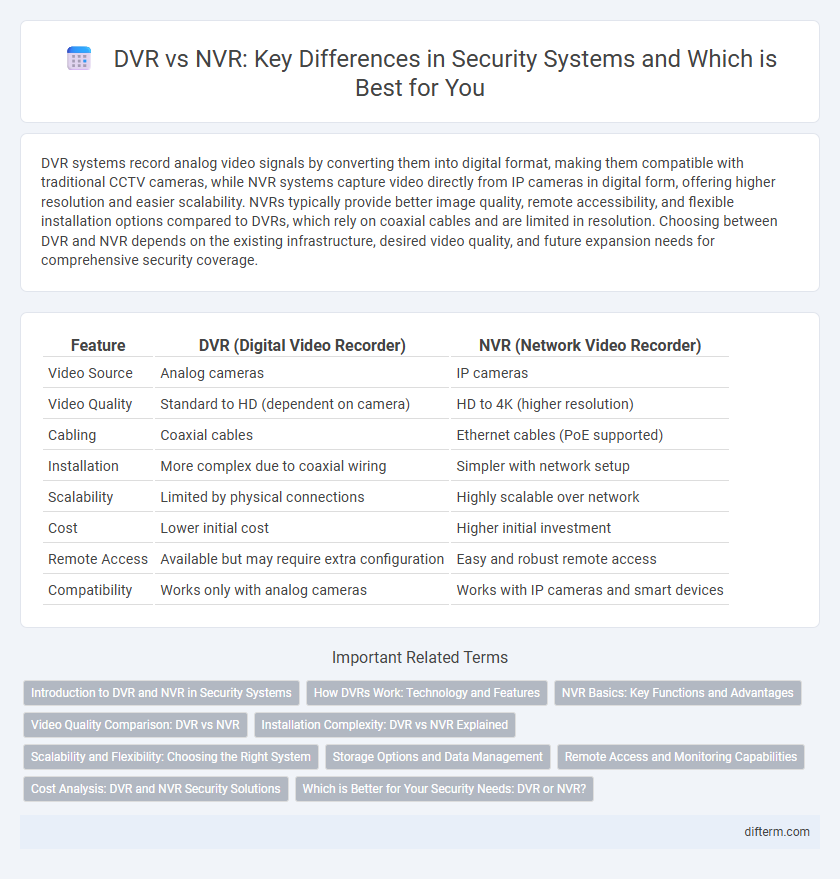DVR systems record analog video signals by converting them into digital format, making them compatible with traditional CCTV cameras, while NVR systems capture video directly from IP cameras in digital form, offering higher resolution and easier scalability. NVRs typically provide better image quality, remote accessibility, and flexible installation options compared to DVRs, which rely on coaxial cables and are limited in resolution. Choosing between DVR and NVR depends on the existing infrastructure, desired video quality, and future expansion needs for comprehensive security coverage.
Table of Comparison
| Feature | DVR (Digital Video Recorder) | NVR (Network Video Recorder) |
|---|---|---|
| Video Source | Analog cameras | IP cameras |
| Video Quality | Standard to HD (dependent on camera) | HD to 4K (higher resolution) |
| Cabling | Coaxial cables | Ethernet cables (PoE supported) |
| Installation | More complex due to coaxial wiring | Simpler with network setup |
| Scalability | Limited by physical connections | Highly scalable over network |
| Cost | Lower initial cost | Higher initial investment |
| Remote Access | Available but may require extra configuration | Easy and robust remote access |
| Compatibility | Works only with analog cameras | Works with IP cameras and smart devices |
Introduction to DVR and NVR in Security Systems
DVR (Digital Video Recorder) systems record analog video signals from CCTV cameras, storing footage on local hard drives, making them suitable for traditional security setups with coaxial cables. NVR (Network Video Recorder) systems capture digital video streams from IP cameras over Ethernet networks, offering higher resolution and remote accessibility for modern surveillance needs. Both DVR and NVR serve critical roles in security systems, with DVRs excelling in cost-effective analog integration and NVRs providing advanced scalability and video quality.
How DVRs Work: Technology and Features
DVRs (Digital Video Recorders) process analog video signals from CCTV cameras, converting them into digital format for storage and playback. They use coaxial cables to transmit video data and typically offer features like real-time recording, motion detection, and remote access via dedicated software or mobile apps. DVR systems are favored for their compatibility with existing analog systems and cost-effectiveness in security surveillance setups.
NVR Basics: Key Functions and Advantages
NVR (Network Video Recorder) systems process video data over IP networks, enabling centralized storage and remote access to high-resolution footage from multiple IP cameras. Key functions include real-time video streaming, intelligent analytics, and scalable storage management, enhancing security monitoring efficiency. Advantages of NVRs over DVRs include higher video quality, easier installation without coaxial cables, and seamless integration with advanced network security protocols.
Video Quality Comparison: DVR vs NVR
NVR systems typically provide higher video quality than DVRs due to their ability to process digital signals directly from IP cameras, supporting resolutions up to 4K and beyond. DVRs rely on analog cameras with lower resolution limits, often maxing out at 1080p, resulting in less detailed footage. NVRs also offer advanced features like scalable bitrate and compression technologies (H.265), enhancing video clarity and storage efficiency compared to traditional DVR setups.
Installation Complexity: DVR vs NVR Explained
DVR systems typically require coaxial cable installations, which can be more labor-intensive and less flexible compared to the Ethernet cables used by NVR systems. NVR setups leverage existing network infrastructure, making installation more straightforward and scalable for IP camera integration. The complexity of DVR installations increases with distance due to signal degradation, whereas NVR installations benefit from Power over Ethernet (PoE) technology, simplifying power and data delivery.
Scalability and Flexibility: Choosing the Right System
NVR systems offer greater scalability and flexibility compared to DVRs by supporting IP cameras that can be easily added or relocated without complex wiring. Unlike DVRs, which rely on analog connections and fixed channel capacities, NVRs accommodate expanding surveillance needs with minimal infrastructure changes. This adaptability makes NVRs ideal for growing businesses or large-scale security deployments requiring seamless integration and upgrading.
Storage Options and Data Management
DVR systems store footage locally on hard drives within the device, offering limited scalability and potentially slower access speeds due to analog signal conversion. NVR systems utilize network-based storage options like NAS or cloud servers, enabling flexible scalability and faster data retrieval through digital IP camera feeds. Efficient data management in NVRs allows centralized monitoring, easy backup, and advanced analytics integration compared to the more rigid, onsite storage constraints of DVRs.
Remote Access and Monitoring Capabilities
NVR systems offer superior remote access and monitoring capabilities compared to DVRs by utilizing IP-based networks that allow real-time video streaming and multi-device connectivity. DVRs rely on analog signals and often require direct connections or proprietary software, limiting remote viewing flexibility. Advanced NVR solutions support cloud integration and mobile app access, enhancing security management from any location.
Cost Analysis: DVR and NVR Security Solutions
DVR (Digital Video Recorder) systems generally have a lower initial cost compared to NVR (Network Video Recorder) setups due to their reliance on analog cameras and simpler cabling requirements. NVR systems involve higher upfront expenses related to IP cameras and network infrastructure but offer scalability, higher resolution, and advanced features that can reduce long-term operational costs. Evaluating total cost of ownership requires considering installation, maintenance, and future expansion demands unique to each security solution.
Which is Better for Your Security Needs: DVR or NVR?
DVR (Digital Video Recorder) systems use analog cameras and are ideal for budget-conscious setups with existing coaxial wiring, offering reliable security recording with limited resolution. NVR (Network Video Recorder) systems support IP cameras, providing higher video quality, more flexible installation, and advanced features like remote access and scalable storage, making them suitable for modern, comprehensive security solutions. Choosing between DVR and NVR depends on factors such as desired video quality, installation environment, and future scalability requirements for optimal security performance.
DVR vs NVR Infographic

 difterm.com
difterm.com